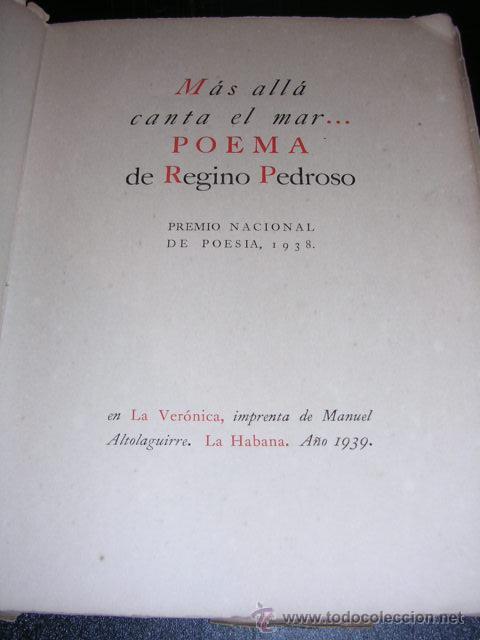4.1.1.10.5 The poetry collection “Más allá canta el mar” (Beyond the Sea Sings), 1938, by Regino Pedroso

This text constitutes Regino Pedroso’s masterpiece, as it finally manages to combine profound political and social content with refined poetic expression, in precise verses of high connotative value, the fruit of a great deal of cognitive and experiential experience in his work with lyric poetry, from content and emotion, to then seek the substance within the fabric of the words.
Throughout the text, the sea constitutes a symbol of life: its colors, its waves, sometimes gentle and sometimes dizzying, the vicissitudes that man encounters in his path as an individual—the naked sailor, tormented by the bitter waves—and the collective struggle against hostile forces. However, beyond the metaphor, there is a clear perception of life as a “social order,” imposed by men themselves and not an inherent circumstance.
Although these verses also have a social content, this content passes through the sieve of his individual self, settles within the being who sings and feels like everyone else, without leaving his creative intimacy, the result of a greater internalization of his social environment, a fuller identification that is not realized from the conscious but comes from a deeper shock.
The text has a certain epic tone in the historical sense of human life on earth. It is broader than its predecessors, as it goes beyond the framework of the workshop and its machines as a restricted sphere of humanity to launch itself into the vastness of the sea, at the same time a symbol of the immutable in time.
The sensoriality of his poetry is significant, an impressionism that later, through association, leads to broader generalizations, a theory and poetics of the human that intertwine. At times, the text reveals heartfelt notes of pessimism, but overall, the author trusts in the strength of man to tame his destiny, even those that others try to impose upon him.
This piece, which earned him the 1939 National Literature Prize, constitutes a higher step in Regino Pedroso’s poetic understanding of the world, where the political and the social are inserted into a broad perspective of the human, captured in a high-quality lyricism, with a foundation in the mastery of diverse expressive resources, which make this one of the most important works of social poetry and poetry in its broadest sense for the Cuban tradition.








